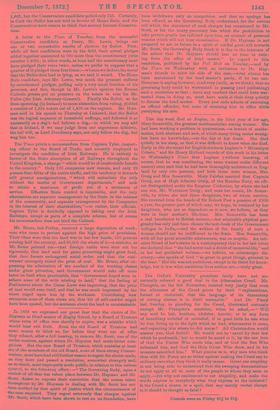This day week died at Naples, in the 92nd year
of her age, Mary Somerville, the greatest mathematician among women. She had been working a problem in quaternions,—a branch of mathe- matics, both abstruse and new, of whioh many living senior wrang- lers have no knowledge,—on the day of her death. She died quietly in her sleep, so that it was difficult to know when she died. Early in life she recast for English students Laplace's " Mdcanique Celeste," and Sir Henry Holland records of this work in his letter to Wednesday's Times that Laplace (without knowing, of course, that he was mentioning the same woman under different names) once said that he had been thoroughly understood in Eng- land by only two persons, and both these were women, Mrs. Greig and Mrs. Somerville. Mary Fairfax married first Captain Greig, son of High Admiral Greig, of the Russian Navy, an offi- cer distinguished under the Empress Catherine, by whom she had one son, Mr. Woronzow Greig ; and next her cousin, Dr. Somer- ville, by whom she had three daughters, two of whom survive. She received from the hands of Sir Robert Peel a pension of 1300 a year, the greater part of which may, we hope, be retained by her daughters, who are as dependent on it now, we believe, as they were in their mother's life-time. Mrs. Somerville has been a real benefactor to British science,—her admirable physical geo- graphy has only just been chosen the text-book of the Government colleges in India,—and the welfare of the family of such a woman should not be indifferent to the State. Mrs. Somerville, with all her great scientific attainments, was no sceptic. An inti- mate friend of her's states in a contemporary that in her last letter she declared that "she had never had a doubt of immortal life," and in her last published volume,—we believe, on microscopic dis- covery,—she speaks of God "as great in great things, greatest in the least." Her life was not ambitious, except in its thirst for know- ledge, but it was what ambitious lives seldom are,—truly great.


































 Previous page
Previous page